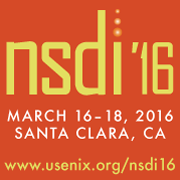The Design and Implementation of the Warp Transactional Filesystem
Robert Escriva and Emin Gün Sirer, Cornell University
This paper introduces the Warp Transactional Filesystem (WTF), a novel, transactional, POSIX-compatible filesystem based on a new file slicing API that enables efficient zero-copy file transformations. WTF provides transactional access spanning multiple files in a distributed filesystem. Further, the file slicing API enables applications to construct files from the contents of other files without having to rewrite or relocate data. Combined, these enable a new class of high-performance applications. Experiments show that WTF can qualitatively outperform the industry-standard HDFS distributed filesystem, up to a factor of four in a sorting benchmark, by reducing I/O costs. Microbenchmarks indicate that the new features of WTF impose only a modest overhead on top of the POSIX-compatible API.
Open Access Media
USENIX is committed to Open Access to the research presented at our events. Papers and proceedings are freely available to everyone once the event begins. Any video, audio, and/or slides that are posted after the event are also free and open to everyone. Support USENIX and our commitment to Open Access.
author = {Robert Escriva and Emin Gun Sirer},
title = {The Design and Implementation of the Warp Transactional Filesystem},
booktitle = {13th USENIX Symposium on Networked Systems Design and Implementation (NSDI 16)},
year = {2016},
isbn = {978-1-931971-29-4},
address = {Santa Clara, CA},
pages = {469--483},
url = {https://www.usenix.org/conference/nsdi16/technical-sessions/presentation/escriva},
publisher = {USENIX Association},
month = mar
}















connect with us